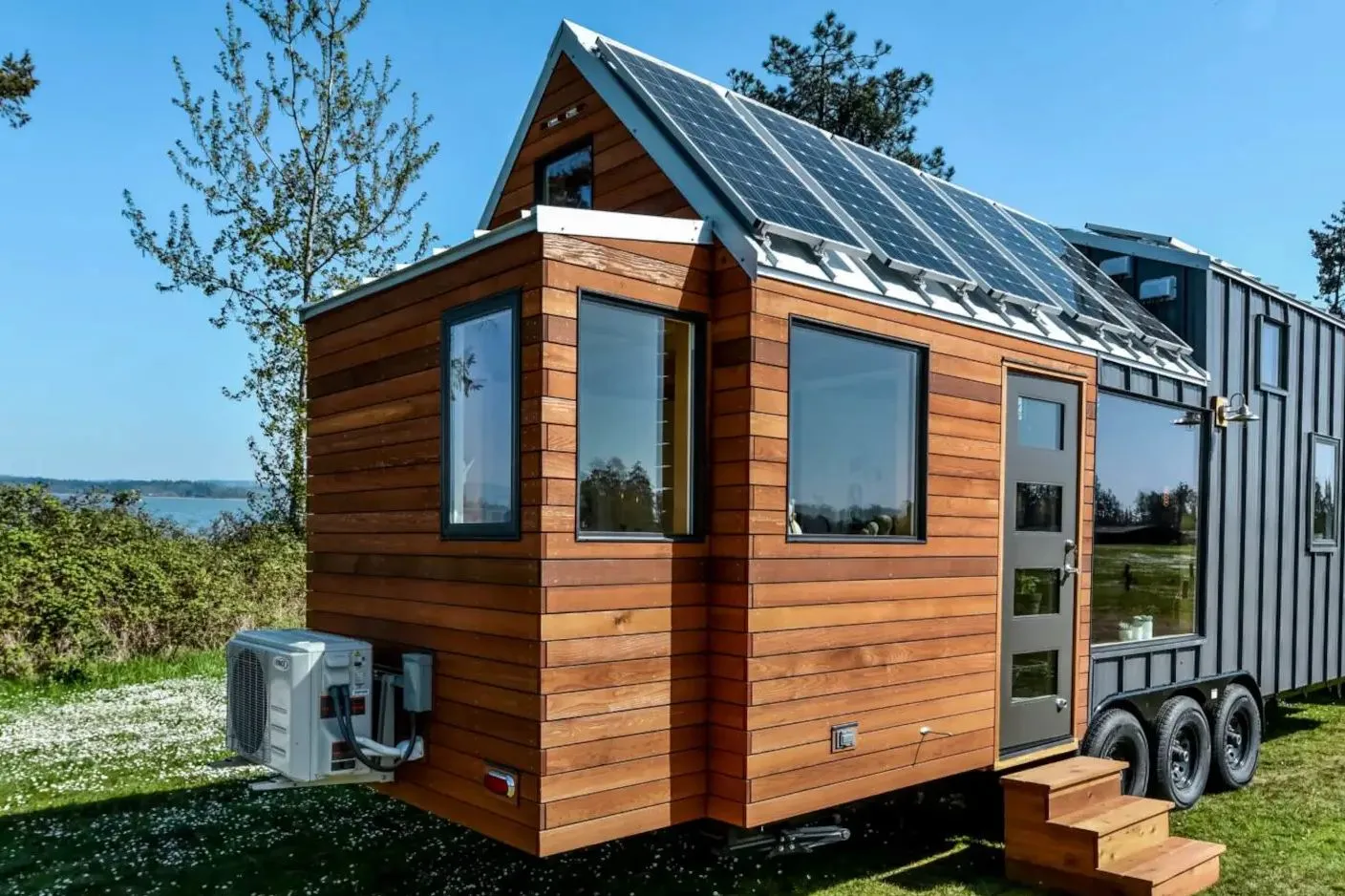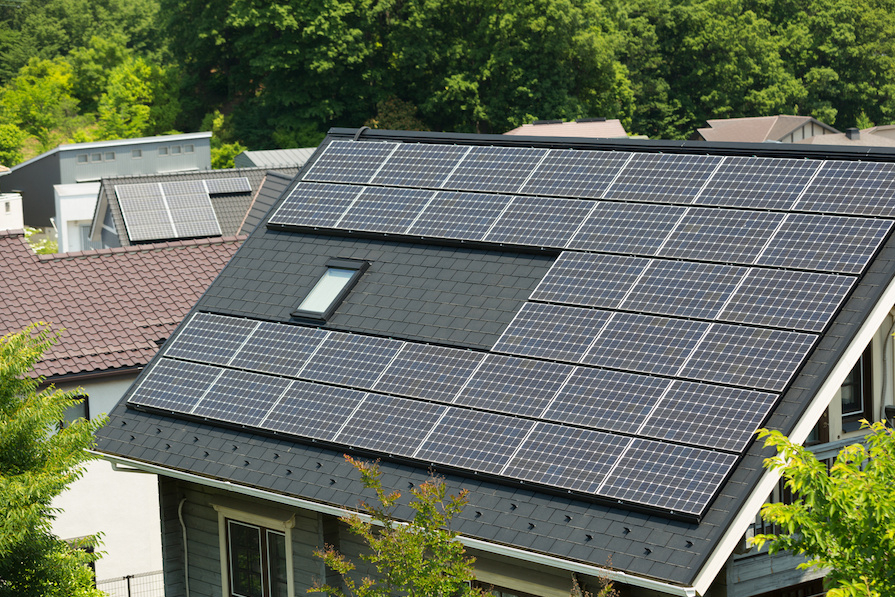
Introduction to House Solar Panels
A house solar panels is a device that converts solar light into electricity, usually installed on the roof of a building or other sunny location. Here are some basic introductions to solar panels:
How Do House Solar Panels Work?
House Solar panels are constructed using multiple solar cells made from semiconductor materials such as silicon. When sunlight hits these cells, it triggers a process called the photovoltaic effect, which generates a direct current (DC) of electricity. This DC electricity is then converted into alternating current (AC) through an inverter, making it suitable for powering household appliances and electronics.
Types of House Solar Panels
There are several types of solar panels available, each with its own set of characteristics and benefits. The most prevalent types include monocrystalline, polycrystalline, and thin-film solar panels. Polycrystalline panels are cost-effective, while monocrystalline panels are known for their outstanding efficiency and sleek appearance. On the other hand, thin-film panels offer flexibility and can be fitted onto various surfaces.
Advantages of Using House Solar Panels
- Reduced Electricity Bills: One of the most significant benefits of solar panels is the reduction in electricity bills. By generating your own electricity, you can significantly decrease your reliance on the grid, leading to substantial savings over time.
- Low Maintenance: Solar panels are relatively low-maintenance devices. Regular cleaning to remove dust and debris is usually sufficient to keep them operating efficiently. With non-movable parts, there is minimal mechanical failure.
- Environmental Benefits: Utilizing solar panels significantly reduces your carbon footprint. By generating clean electricity from sunlight, you contribute to a healthier planet by decreasing reliance on fossil fuels.
- Energy Independence: Solar panels provide homeowners with energy independence. You’re less susceptible to energy price fluctuations and power outages, giving you more control over your energy consumption.

Factors to Consider Before Installing Solar Panels
Location and Sunlight Exposure: The amount of sunshine that solar panels receive affects how effective they are. Before installation, assess your location’s solar potential to ensure optimal energy production.
Roof Suitability: The type and angle of your roof can impact the efficiency of solar panels. A south-facing roof with minimal shading is ideal for maximizing energy production.
Initial Investment: While solar panel installation requires an upfront investment, the long-term financial benefits often outweigh the initial costs.
Available Incentives: Many governments offer incentives such as tax credits and rebates to encourage solar panel adoption. Research available incentives in your area to make the most of these opportunities.
The Installation Process
The process of solar panel installation typically involves the following steps:
Site Assessment: A professional assesses your roof’s suitability and sun exposure.
Permitting: Necessary permits are obtained from local authorities.
Installation: Solar panels are securely mounted on the roof.
Wiring: Wiring connects the panels to the inverter and the electrical panel.
Inverter Installation: The inverter is installed to convert DC to AC.
Connection: The electricity grid is interconnected with the solar system.
Inspection: A final inspection ensures the system meets safety and performance standards.
Maximizing Energy Production
Net Metering: You can reduce your energy bills even more with net metering by returning any extra electricity to the grid.
Battery Storage: Batteries store excess energy for use during cloudy days or at night, increasing your energy self-sufficiency.
Long-term Financial Benefits
Return on Investment (ROI): Over time, the savings on electricity bills can lead to a positive ROI, making solar panels a smart financial choice.
Increased Property Value: Homes equipped with solar panels often have higher property values, appealing to eco-conscious buyers.
Environmental Impact of Solar Panels
Reduction in Carbon Footprint: By generating clean energy, solar panels play a vital role in reducing carbon emissions and combating climate change.
Less Dependency on Fossil Fuels: Solar energy reduces the need for fossil fuels, contributing to the preservation of natural resources.
Addressing Common Concerns
Weather and Cloudy Days: On cloudy days, solar panels can still produce electricity, although their efficiency may be slightly lower.
Aesthetics and Design: Solar panels are available in various styles and can seamlessly integrate into different architectural designs.
Maintenance Costs: Maintenance costs for solar panels are minimal, consisting mainly of occasional cleaning and inspections.
Solar Panel Maintenance
Regular cleaning with a hose and soft brush, along with yearly professional inspections, is sufficient to maintain optimal performance.
Conclusion: Embracing a Brighter, Sustainable Future
house Solar panels are more than just an energy solution; they are a stepping stone toward a cleaner and more sustainable future. By harnessing the power of the sun, we can reduce our reliance on fossil fuels, lower our carbon footprint, and enjoy substantial financial benefits. As technology advances and costs decrease, solar panels are becoming an increasingly viable and attractive option for homeowners worldwide.

Case Study: House Solar Panels Transforming Energy Consumption
Background
The Johnson family, residing in a suburban neighborhood, was concerned about rising energy costs and their impact on the environment. After attending a local sustainability seminar, they decided to explore the possibility of installing solar house panels to harness renewable energy and reduce their carbon footprint.
Situation
The Johnsons’ residence featured a south-facing roof with minimal shading, making it an ideal candidate for solar panel installation. With their electricity bills steadily increasing, they were motivated to invest in a solution that would not only cut costs but also contribute to a greener future.
Solution
After thorough research and consultations with solar energy experts, the Johnsons opted for a solar panel system tailored to their energy needs. The system consisted of monocrystalline solar panels known for their high efficiency and sleek design. Additionally, they decided to incorporate battery storage to store excess energy for use during cloudy days and power outages.
Implementation
The installation process took approximately two weeks. The solar panels were carefully mounted on the Johnsons’ roof, ensuring optimal sun exposure. The wiring was meticulously installed to connect the panels to the inverter and the home’s electrical panel. The inverter, which converted the generated DC electricity into AC, was positioned in an easily accessible location.
Results
The impact of the solar panel installation was immediately noticeable. The Johnsons saw a significant reduction in their monthly electricity bills, with surplus energy being fed back into the grid through net metering. The battery storage system provided peace of mind during overcast days and power outages, ensuring uninterrupted power supply for essential appliances.
Environmental Contribution
The Johnsons’ decision to go solar translated into a substantial reduction in their carbon footprint. By generating clean energy from sunlight, they prevented the emission of several tons of greenhouse gasses into the atmosphere each year.
Financial Benefits
Over the years, the Johnsons witnessed a remarkable return on their investment. The initial upfront cost of installing the solar panels and battery system was outweighed by the substantial savings on electricity bills. Their home’s resale value also increased due to its eco-friendly features.

FAQs About House Solar Panels
Do solar panels work with all kinds of roofs?
Solar panels can be installed on various roof types, but the suitability depends on factors like roof angle and shading.
Do House solar panels work during power outages?
Standard grid-tied systems are designed to shut off during power outages for safety reasons. However, backup solutions like batteries can provide power during outages.
What happens on days with little sunlight?
While solar panels are less efficient on cloudy days, they can still generate electricity, ensuring a continuous power supply.
Can I install House solar panels myself?
It’s recommended to hire professionals for installation to ensure safety, efficiency, and adherence to local regulations.
How long do solar panels last?
Most solar panels come with warranties ranging from 25 to 30 years, but they can last even longer with proper maintenance.










